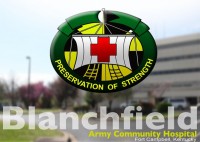Technique adds to growing list of non-opioid pain management practices at Fort Campbell
 Fort Campbell, KY – Blanchfield Army Community Hospital Physical Therapy is hosting level one and two dry needling courses July 19th-24th for military and federal healthcare providers.
Fort Campbell, KY – Blanchfield Army Community Hospital Physical Therapy is hosting level one and two dry needling courses July 19th-24th for military and federal healthcare providers.
Physical therapists Maj. Leigh Anne Lechanski, BACH physical therapy department, and Maj. Richard Westrick, U.S. Army Research Institute of Environmental Medicine deputy chief of military performance, are teaching two levels of dry needling to 27 military and federal physical therapists and primary care providers this week.

The U.S. Army Medical Command’s Pain Management Campaign Plan was developed to support Health Affairs Policy 11-003, the policy for Comprehensive Pain Management, which was published April 25th, 2011. The policy encompasses key components of pain assessment, pain treatment and management of acute and chronic pain to decrease the utilization of opioid medications.
A summary issued by the Office of the Secretary of Defense in September 2012 states that approximately 100 million adults in this country are affected by chronic pain, costing between $560 to $635 billion in direct medical treatment costs and lost productivity.

BACH providers have worked collectively with the hospital pharmacists for several years to reduce the amount of pain prescriptions active duty Soldiers are prescribed and help Soldiers discover alternative ways to treat their pain. Much of this has occurred through pharmacists working with individual providers and patients on four or more medications.
With one-on-one medication counseling, BACH providers are utilizing MEDCOM’s Pain Management Task Force recommendations for holistic, multidisciplinary approach, state-of-the-art modalities and technologies to reduce prescriptions and improve patient quality of life. In addition, the Intrepid Spirit offers an array of complimentary techniques to help Soldiers and family members overcome pain.
Dry needling is another method to continue to integrate more of these non-opioid pain management practices into the Soldier and Patient Centered Medical Homes on Fort Campbell.
“Our goal in offering the course is to improve non-pharmacologic pain management capabilities in primary care and rehabilitation and have more Army providers credentialed in dry needling,” said Maj. Richard Westrick.
The training is being offered to 27 providers free of charge to earn 22 continuing medical education hours per course, Lechanski said.
“Training these providers at Fort Campbell rather than sending them to a conference offsite saves the Army roughly $60 thousand in travel costs and allows training for more providers to participate and become credentialed.”



